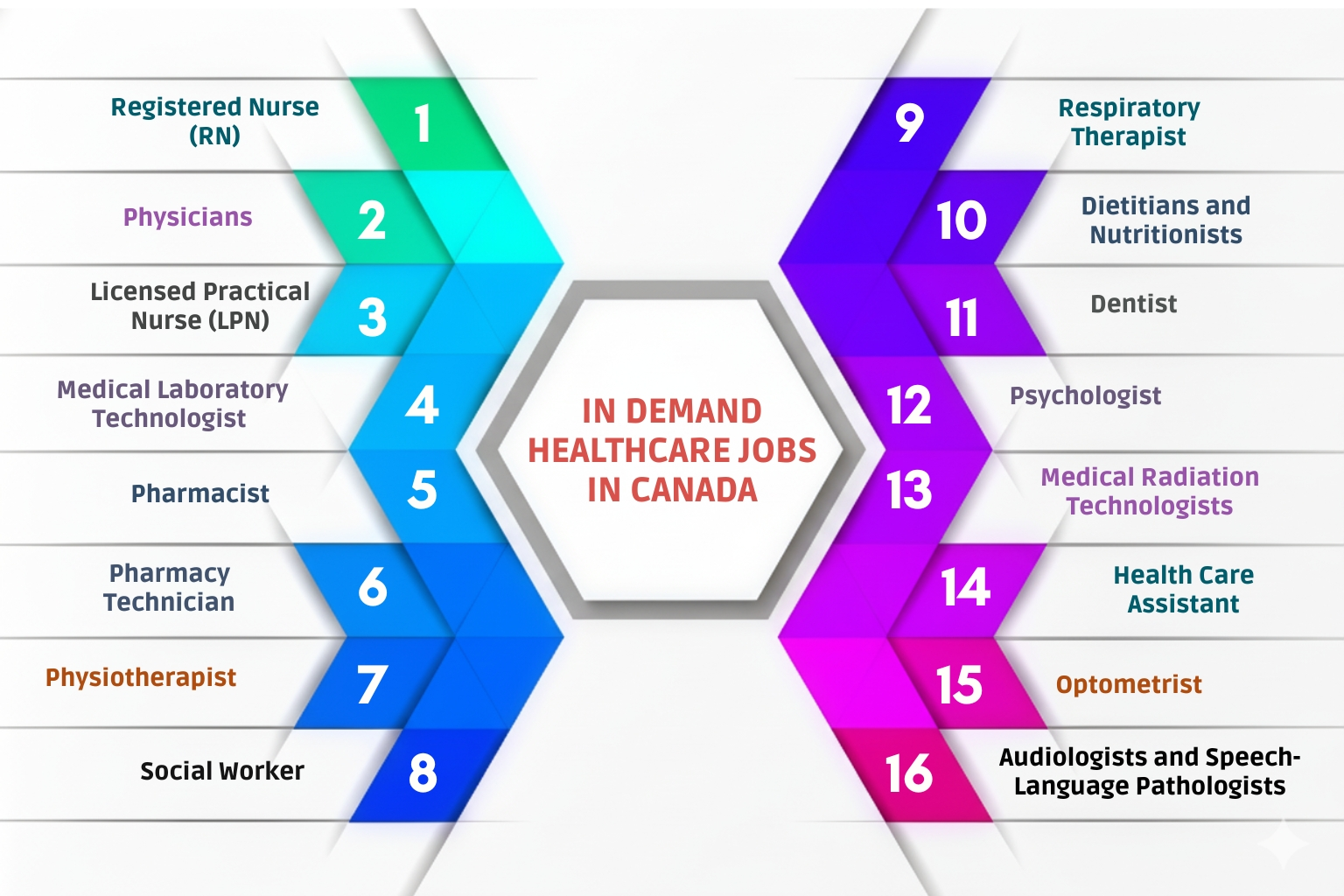If there’s one country where your healthcare skills can open endless doors, it’s Canada! With an aging population, expanding healthcare infrastructure, and a growing need for skilled professionals, the demand for doctors, nurses, and allied health experts has never been higher. If you’ve got the qualifications, compassion, and courage to make a move, it’s time to explore the most in-demand healthcare jobs in Canada and how you can land one.
Table Of Content
1In Demand Healthcare Jobs in Canada2Healthcare Jobs in Canada with Visa Sponsorship3How to get Healthcare Jobs in Canada4Conclusion5Frequently Asked Questions
In Demand Healthcare Jobs in Canada
Below are the top in-demand healthcare jobs in Canada:
1. Registered Nurse (RN)
Registered nurses are highly sought after across Canada’s hospitals, clinics, and long-term care facilities. RNs deliver frontline patient care and are central to medical team coordination.
Nurse Roles and Responsibilities:
- Assess, monitor, and record patient health
- Administer medications and treatments
- Collaborate with healthcare teams
- Educate patients/families about care plans
- Support surgery, recovery, and emergencies
Average Salary for Nurses in Canada: CAD $60,000–$90,000 per year.
2. Physicians – General Practitioners and Family Doctors
General practitioners (GPs) and family physicians are primary healthcare providers who diagnose, treat, and manage a wide range of acute and chronic health conditions. They serve as the first point of contact in the healthcare system and provide continuous, comprehensive care to individuals and families over time. Family physicians undergo additional specialized training in family medicine, enabling them to offer broader and long-term care management.
Doctor Roles and Responsibilities:
- Examine patients and take detailed medical histories
- Order diagnostic tests such as lab work and X-rays and consult with specialists
- Prescribe and administer medications and treatments
- Perform and assist in routine surgeries and emergency care
- Provide acute and chronic disease management
- Vaccinate patients to prevent diseases
- Deliver babies and offer prenatal and postnatal care
- Advise patients and families on health promotion, illness prevention, and lifestyle choices
- Provide counseling and support for physical and mental health issues
- Act as patient advocates and coordinate primary care
- Supervise home care services and report vital statistics to government bodies
Average Salary for Doctors in Canada: CAD $160,000–$320,000 per year.
3. Licensed Practical Nurse (LPN)
LPNs assist with basic nursing care and play key support roles under supervision of RNs, mainly in hospitals, clinics, and elder care settings.
Licensed Practical Nurse Roles and Responsibilities:
- Provide bedside care (wounds, hygiene)
- Monitor patient progress
- Report changes to nurses/doctors
- Collect specimens for tests
- Administer medications as authorized
Average Salary for LP Nurses in Canada: CAD $60,900–$130,400 per year.
4. Medical Laboratory Technologist
Essential in diagnostic labs, Medical Laboratory Technologist perform clinical tests that guide treatment decisions. This role is among the most sought-after healthcare jobs in Canada, with growing demand across hospitals, clinics, and research centers.
Medical Laboratory Technologist Roles and Responsibilities:
- Collect/analyze blood, tissue, fluid
- Operate lab equipment
- Ensure safety and protocol adherence
- Communicate results to physicians
Average Salary for Medical Laboratory Technologists in Canada: CAD $64,233–$82,377 per year.
5. Pharmacist
Pharmacists in Canada dispense medications and counsel patients in retail, hospital, and clinical settings. Demand remains strong due to population growth and aging.
Pharmacist Roles and Responsibilities:
- Prepare and dispense prescribed drugs
- Offer medication advice and safety info
- Manage inventory and compliance
- Immunization and health promotion
Average Salary for Pharmacists in Canada: CAD $91,000–$112,000 per year.
6. Pharmacy Technician
The Pharmacy technicians prepare prescriptions under guidance from pharmacists and maintain inventory in hospitals and drug stores.
Pharmacy Technician Roles and Responsibilities:
- Prepare and label medications
- Verify dosage calculations
- Manage stock and record keeping
- Support patient services
Average Salary for Pharmacy Technicians in Canada: CAD $43,000–$54,000 per year.
7. Physiotherapist
Physiotherapists help patients restore movement from injury or illness and design rehabilitation programs. They are essential in hospitals, rehab centers, and private practice.
Physiotherapist Roles and Responsibilities:
- Assess mobility, strength, and pain levels
- Create exercise and therapy plans
- Educate on injury prevention
- Guide patients through exercises
Average Salary for Physiotherapists in Canada: CAD $79,346–$99,890 per year.
8. Social Worker
The Social workers play a vital role in community health, helping patients and families navigate mental health, recovery, and social challenges.
Social Worker Roles and Responsibilities:
- Support mental health and counseling
- Develop care and intervention plans
- Connect with community supports
- Advocate for clients and families
Average Salary for Social Workers in Canada: CAD $55,000–$85,000 per year.
9. Respiratory Therapist
The Respiratory therapists care for patients with breathing disorders in acute/chronic settings, including ICUs and emergency units.
Respiratory Therapist Roles and Responsibilities:
- Assess lung function and breathing
- Administer oxygen and therapies
- Manage ventilators and monitors
- Educate patients/families
Average Salary for Respiratory Therapists in Canada: CAD $76,500–$98,800 per year.
10. Dietitian and Nutritionist
Dietitians and nutritionists in Canada are experts in food and nutrition who develop, implement, and oversee nutrition and food service programs across various settings. Their role is essential in promoting health, preventing and managing diseases through dietary guidance, and improving community well-being, making it one of the most impactful healthcare jobs in Canada today.
Dietitian and Nutritionist Roles and Responsibilities:
- Develop, implement, and evaluate nutrition programs for individuals, communities, and populations
- Manage food service systems in hospitals, long-term care facilities, schools, and private outlets
- Assess and evaluate nutritional status of individuals and provide personalized nutrition guidance
- Plan and deliver nutrition education programs and materials
- Analyze scientific nutritional research to improve food quality and preparation
- Provide consultation and advice to health professionals, community groups, government, and the media
- Supervise dietetic interns and collaborate as part of interdisciplinary healthcare teams
- May work in clinical, public health, community, research, or food industry roles
Average Salary for Dietitians and Nutritionists in Canada: CAD $53,000–$78,000 per year.
11. Dentist
Dentists in Canada are key oral healthcare professionals responsible for diagnosing, treating, and preventing dental diseases and disorders. Their work plays a significant role in the general health and well-being of the population.
Dentist Roles and Responsibilities:
- Examine teeth, gums, and mouth to detect problems and diseases
- Perform routine check-ups, cleanings, fillings, extractions, crowns, and root canals
- Take and interpret x-rays and diagnostic tests
- Advise patients on oral hygiene and preventive care
- Develop treatment plans and refer to dental specialists as needed
- Supervise dental assistants, hygienists, and administrative staff
Average Salary for Dentists in Canada: CAD $142,300–$418,700 per year.
12. Psychologist
Psychologists in Canada study human behavior, emotions, and mental processes to provide diagnosis, therapy, and support for mental health and well-being. They work in diverse settings including hospitals, schools, private practice, and community organizations.
Psychologist Roles and Responsibilities:
- Conduct diagnostic interviews and psychological assessments
- Provide individual, group, and family therapy
- Develop treatment plans for mental health issues
- Collaborate with healthcare and educational professionals
- Engage in research and advocacy for mental health
Average Salary for Psychologists in Canada: CAD $84,201–$123,474 per year.
13. Medical Radiation Technologist
Medical Radiation Technologists (MRTs) in Canada operate imaging equipment, such as X-rays, CT scans, and MRIs, to produce diagnostic images used by physicians for diagnosing diseases and injuries. They also administer radiation therapy to treat cancer patients. MRTs are employed in hospitals, cancer treatment centers, clinics, and radiological laboratories.
Medical Radiation Technologist Roles and Responsibilities:
- Operate radiation and imaging technology to capture internal body images
- Prepare patients for radiation therapy and operate treatment equipment
- Ensure patient safety and follow radiation protection procedures
- Maintain and calibrate medical equipment
- Collaborate with radiologists, oncologists, and other healthcare professionals
- Monitor patient conditions during procedures and respond to emergencies
- Maintain detailed reports and imaging records
Average Salary for Medical Radiation Technologists in Canada: CAD $60,000–$90,000 per year.
14. Health Care Assistant
Healthcare assistants aid patients and nurses in daily personal care, especially in long-term and eldercare homes. Growing elderly populations drive demand.
Health Care Assistant Roles and Responsibilities:
- Assist with bathing, feeding, mobility
- Monitor patient wellbeing
- Support housekeeping and safety
- Report changes to nursing staff
Average Salary for Health Care Assistants in Canada: CAD $40,000–$47,000 per year.
15. Optometrist
Optometrists in Canada are eye care professionals specializing in examining, diagnosing, treating, and managing vision problems and eye diseases. They play a vital role in preventing and managing disorders affecting vision and ocular health, working in clinics, hospitals, and private practices.
Optometrist Roles and Responsibilities:
- Conduct eye examinations and vision tests for patients of all ages
- Diagnose vision problems and eye diseases
- Prescribe corrective lenses such as glasses and contact lenses
- Provide treatment for eye diseases, including managing conditions like glaucoma or infections
- Refer patients to ophthalmologists or other specialists when necessary
- Educate patients on eye care and preventive measures
- Maintain detailed patient records and reports
Average Salary for Optometrists in Canada: CAD $81,000–$162,000 per year.
16. Audiologist and Speech-Language Pathologist
Audiologists and Speech-Language Pathologists play crucial roles in diagnosing and treating hearing, balance, speech, language, and swallowing disorders across Canada. This demand is driven by an aging population and growing awareness of communication health.
Audiologist and Speech-Language Pathologist Roles and Responsibilities:
- Audiologists assess and treat hearing loss, tinnitus, and balance disorders
- Speech-Language Pathologists diagnose and treat speech impediments, language processing, voice, fluency, and swallowing issues
- Develop individualized treatment plans and therapies
- Collaborate with healthcare teams and provide patient/family education
- Work in hospitals, clinics, rehabilitation centers, schools, or private practice
Average Salary for Audiologists and Speech-Language Pathologists in Canada: CAD $75,000–$95,000 per year.
These Healthcare jobs in Canada offer strong employment prospects, good wages, and pathways to Canadian permanent residency in 2025.
Healthcare Jobs in Canada with Visa Sponsorship
Visa sponsorship is a process where an individual or organization, usually an employer, takes legal responsibility for helping a foreign national obtain permission to enter or stay in a country for work, study, or family reasons. In the context of employment, it means the employer proves the candidate is qualified and essential for business, provides visa support, and ensures compliance with immigration laws.
Canada offers several pathways for healthcare professionals seeking work with visa sponsorship. Based on current industry patterns and official guidance, here are the most relevant routes and what to expect.
1. Employer-Sponsored Work Permits
Hospitals, clinics, and provincial health authorities often sponsor foreign nurses, caregivers, and allied health professionals when there’s a local shortage. A valid job offer and, in most cases, a Labour Market Impact Assessment (LMIA) are required.
2. Express Entry (Healthcare Category)
Healthcare professionals can qualify for permanent residency through Express Entry programs, especially those targeting in-demand medical occupations. Strong language skills, work experience, and credentials improve eligibility.
3. Provincial and Caregiver Programs
Many provinces offer caregiver or healthcare worker pilot streams leading to permanent residency. These require a job offer in a designated occupation and relevant provincial licensing.
Key considerations by role
- Registered Nurses (RNs): Need provincial licensing and often receive employer sponsorship leading to PR.
- Licensed Practical Nurses (LPNs) / Nurse Practitioners (NPs): Similar licensing and sponsorship options; some provinces offer faster routes.
- Allied Health Professionals / Caregivers: Sponsorship available through LMIA or caregiver programs depending on the province.
Steps to Get Started
1. Identify in-demand healthcare roles and provinces.
2. Secure a valid job offer from an approved employer.
3. Begin provincial licensing or credential assessments early.
4. Explore Express Entry and provincial nominee options.
5. Plan finances for exams, fees, and relocation.
How to get Healthcare Jobs in Canada
Canada offers a wide range of job opportunities in Canada for healthcare professionals seeking rewarding and stable careers. Whether you have a job offer from a Canadian employer or plan to apply independently, understanding the process is essential. Here is the full step-by-step process to get healthcare jobs in Canada.
1. Evaluate Credentials and Eligibility
Verify your healthcare qualifications through Canadian regulatory bodies. This may include credential assessments and meeting licensing requirements, specific to your profession and identifying your NOC code in Canada, the National Occupational Classification that defines your job role and eligibility for immigration or employment purposes.
2. Obtain Certification and Licensing
Complete required exams or certification processes mandated by provincial or national healthcare authorities to practice in Canada.
3. Language Proficiency
Demonstrate proficiency in English or French via approved tests like IELTS or TEF, essential for licensing and immigration.
4. Immigrate Without Job Offer (Optional)
Apply through immigration programs that do not require a job offer upfront, such as the Express Entry (Federal Skilled Worker program) or Provincial Nominee Programs (PNP) that target healthcare occupations. These pathways allow permanent residency applications based on skills, language, and credentials, giving you legal status to search for jobs after arrival.
5. Search and Apply for Healthcare Jobs
Whether before or after immigration, actively apply to healthcare employers via job boards, hospital websites, and provincial health authority career portals.
6. If You Have a Job Offer
- Secure a formal job offer from a Canadian healthcare employer.
- The employer may need to obtain a Labour Market Impact Assessment (LMIA) to prove the necessity of hiring a foreign worker.
- Submit your work permit application supported by the job offer and LMIA if applicable.
- The employer sponsors your visa, supporting the work authorization process and ensuring compliance with Canadian immigration laws.
7. Complete Medical, Background Checks, and Documentation
Undergo required medical exams and police clearance. Gather all necessary documents like job offer letters, proof of credentials, and language test results.
8. Arrive and Start Work
After visa/work permit approval or permanent residency confirmation, prepare for arrival, complete any employer onboarding or licensing finalizations, and commence work legally in Canada’s healthcare sector.
Conclusion
Canada’s healthcare industry offers some of the most rewarding and high paying healthcare jobs in Canada, attracting professionals from across the globe. From specialized nurses and physicians to healthcare managers and medical technologists, these roles not only offer excellent salaries but also come with opportunities for visa sponsorship and long-term career growth. Whether you’re a local graduate or an international applicant, exploring verified listings through trusted sources like the Job Bank in Canada can help you find authentic openings with reputable employers.
Frequently Asked Questions







I need a job as a nurse
Hi Uchenna,
Thank you for reaching out to CanApprove!
We’re glad you took the first step toward your abroad journey.
If you’re looking for clear, personalized guidance based on your profile, goals, and eligible pathways, our expert consultants are here to help you every step of the way.
Book your FREE consultation now!